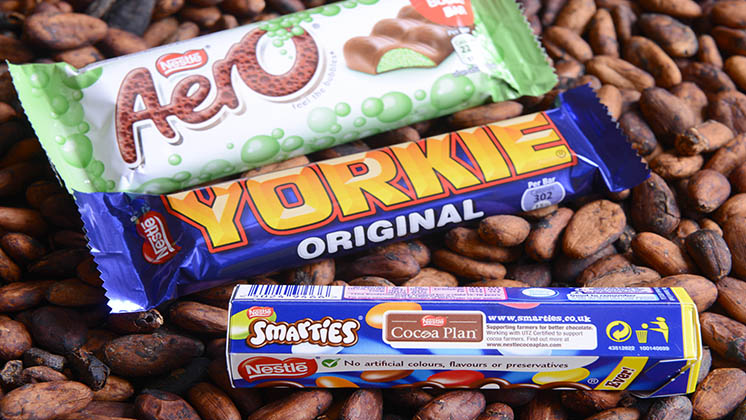 & Ireland has announced it is on target to achieve 100 per cent cocoa from sustainable sources by end of 2015, becoming the first major confectionery company in UK and Ireland to achieve this milestone. By working with UTZ Certified and Fairtrade Foundation, over 60 per cent of cocoa purchased by Nestlé UK & Ireland already comes from certified farms working with the Nestlé Cocoa Plan. This year alone, certified cocoa will be sourced for famous brands such as QUALITY STREET, TOFFEE CRISP, MUNCHIES BLUE RIBAND, and BREAKAWAY. In 2013, Nestlé UK and Ireland bought certified cocoa for SMARTIES, YORKIE and AERO. KIT KAT 4 and 2 Finger became certified in 2010 and 2012 respectively.
& Ireland has announced it is on target to achieve 100 per cent cocoa from sustainable sources by end of 2015, becoming the first major confectionery company in UK and Ireland to achieve this milestone. By working with UTZ Certified and Fairtrade Foundation, over 60 per cent of cocoa purchased by Nestlé UK & Ireland already comes from certified farms working with the Nestlé Cocoa Plan. This year alone, certified cocoa will be sourced for famous brands such as QUALITY STREET, TOFFEE CRISP, MUNCHIES BLUE RIBAND, and BREAKAWAY. In 2013, Nestlé UK and Ireland bought certified cocoa for SMARTIES, YORKIE and AERO. KIT KAT 4 and 2 Finger became certified in 2010 and 2012 respectively.Andrew McIver, Confectionery Managing Director of Nestlé UK & Ireland, comments: “Nestlé UK & Ireland is set to be the first to reach this landmark goal, making a real difference to farmers and their communities. For QUALITY STREET, Nestlé has started purchasing certified cocoa and these products will be on the shelves in time for Christmas this year. This means we are on track to reach 100 per cent by the end of 2015.”
In 2009, Nestlé announced that over the next 10 years it would invest SFr110 million into plant science and sustainability initiatives as part of its broader Nestlé Cocoa Plan, which was developed to support small scale cocoa farmers around the world. Those who benefit include farmers in the Ivory Coast, one of the poorest countries in the world but the source of 40 per cent of the world’s cocoa. UTZ Certified and The Fairtrade Foundation are both partners of the Nestlé Cocoa Plan. In addition, Nestlé is a member of Fair Labor Association and work collaboratively with them to investigate whether children are working on cocoa farms which are supplying its factories.
UTZ certification is awarded to farmers who have been trained to grow better crops, generate more income and create opportunities whilst safeguarding the environment and natural resources. Monitored by independent third parties, the farms and businesses involved must ensure sound agricultural practices, safe and healthy working conditions and must not use child labour.







